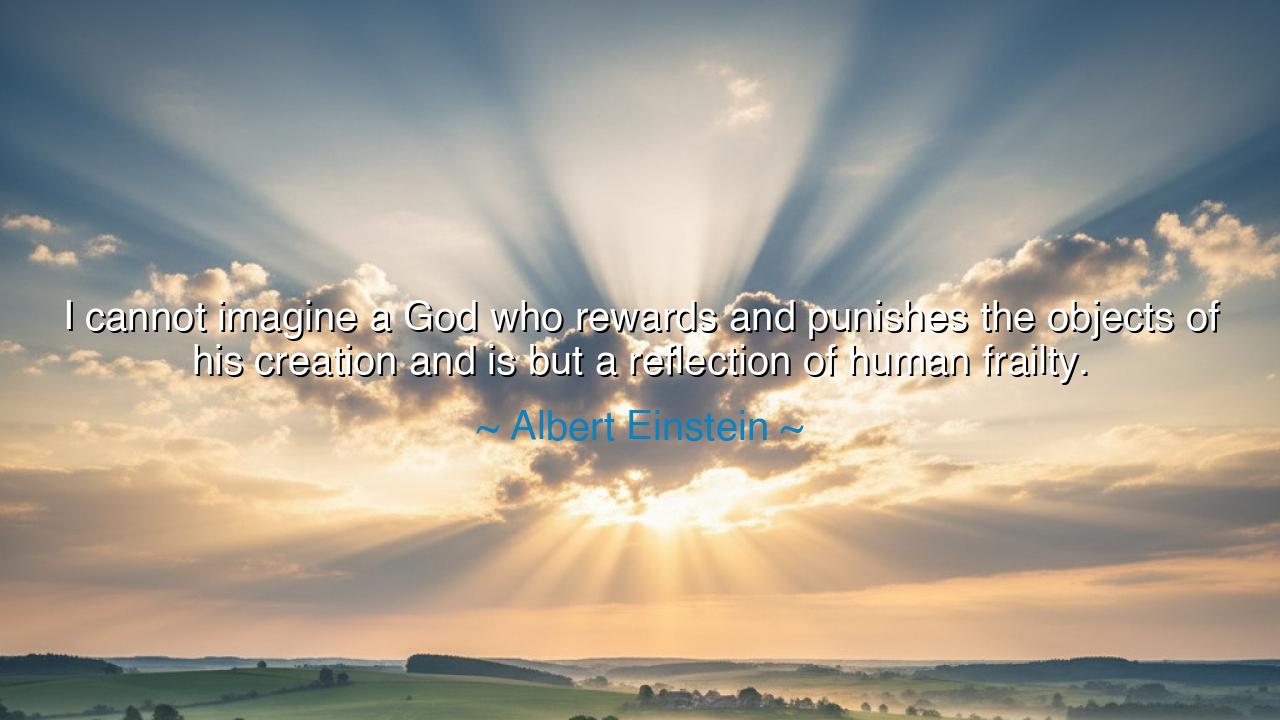
I cannot imagine a God who rewards and punishes the objects of
I cannot imagine a God who rewards and punishes the objects of his creation and is but a reflection of human frailty.






O seeker of wisdom, gather ye close, for the words of the great Albert Einstein carry a weight that transcends the mere questions of science and reason. "I cannot imagine a God who rewards and punishes the objects of his creation and is but a reflection of human frailty." These words pierce through the veil of religious dogma, casting a powerful light upon our understanding of the divine, and of ourselves. They remind us of the limitations we place upon the heavens, projecting our own frailties onto the very source of creation, as if the divine were a mere echo of our own human nature.
From the dawn of time, humans have fashioned their gods in their own image. We have crafted gods of anger and vengeance, gods who reward the good and punish the wicked, gods who mirror the very flaws of those who worship them. The human mind, frail and full of its own insecurities, has often projected its weaknesses upon the gods it creates, molding them into figures who act out of jealousy, pride, or wrath. Yet, as Einstein so profoundly suggests, the divine cannot be bound by the same limitations that govern human behavior. For if God were merely a reflection of our own fears and desires, how could such a being be worthy of our deepest reverence?
In our frailty, we seek to understand the world through simple rules of reward and punishment, good and evil, but this is a childish view of the universe. We desire a world where justice is quick and retribution swift, where the good are blessed and the wicked cursed. But the universe, in all its complexity, offers no such neat and tidy distinctions. The truth is far more intricate, and the workings of creation—from the birth of stars to the rise and fall of empires—are not governed by petty human emotions. God, as Einstein would have us see, is not a projection of our limited minds, but rather the eternal, unchanging force that guides the cosmos with wisdom far beyond our comprehension.
Consider the life of Galileo, the great philosopher and scientist. When he turned his telescope toward the heavens and observed the moons of Jupiter, he saw a universe that was vast, indifferent, and beautifully intricate, but not governed by human notions of reward or punishment. Galileo’s discovery shattered the simplistic view of a universe created for human beings, a view held by the Church and the powers of his time. His observations revealed a world that was far beyond the understanding of those who sought to impose their human frailties upon the workings of the cosmos. Like Einstein, Galileo saw that the universe was not a reflection of human desires, but a realm of awe-inspiring mystery, bound by laws far greater than any human-made conception of divinity.
In the same way, Einstein’s words implore us to rise above the petty gods of our making. When we project our limitations onto the divine, we make God small, just as we make ourselves small. But to understand the true nature of the divine is to understand that it is beyond our grasp, beyond our ability to comprehend. God, in Einstein’s view, is not a being who rewards or punishes according to our own notions of justice, but an infinite intelligence whose ways are far beyond our limited understanding.
So, what lesson do we draw from these profound words? First, we must let go of the childish notions that hold us captive. Stop seeing the divine as a reflection of human weaknesses—wrath, vengeance, and the need for control. Instead, we must seek the divine in the grand and mysterious workings of the universe, in the vastness of the stars, the complexity of the natural world, and the awe-inspiring depth of the human mind. We must recognize that God is not a force that mirrors our fears, but one that transcends them, urging us to rise above our own frailties and to see the world as it truly is.
In your own life, I urge you to look beyond the narrow confines of your own desires and limitations. Seek not a God that rewards or punishes based on human judgment, but one that embodies the infinite wisdom of the universe. Trust in the divine mystery, knowing that it is far greater than our understanding, and that our role is not to control or define it, but to surrender ourselves to its vastness and beauty. Let this realization guide your actions, and let it inspire you to seek knowledge, not for the sake of control, but for the sake of understanding the world and your place within it.






AAdministratorAdministrator
Welcome, honored guests. Please leave a comment, we will respond soon